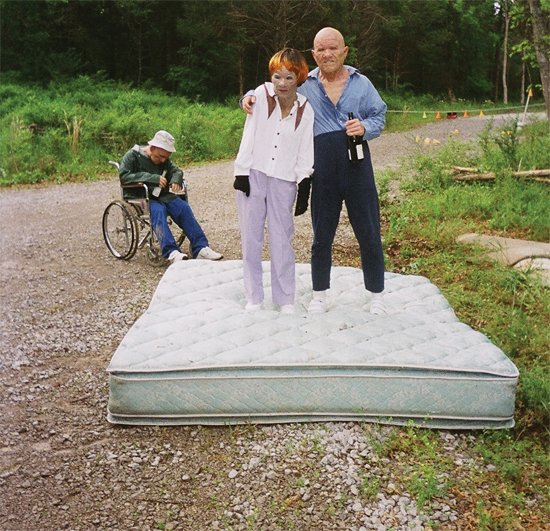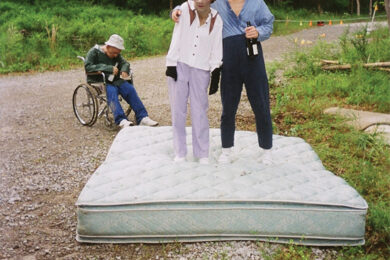Not so long ago, ensconced in the lofty confines of the Pelton Arms, a charmingly beige drinking establishment just a short stumble from the Cutty Sark, I found myself engaged in heated debate about the apparent conservatism of modern cinema. "When was the last time," my interlocutor demanded, "you went to the pictures and came out wondering, was that a film? Can that even be counted as cinema?" Arguably this happens with pop songs all the time – think of Elton John’s insistence that ‘Firestarter’ by The Prodigy was "not music" because you couldn’t play it on a piano. It seems, or at least it did to the particular East Greenwich resident perched atop a bar stool before me, that such a formal stretching of boundaries is more unusual in mainstream cinema these days.
Not long after this conversation I attended a press screening of Trash Humpers, the new film by Harmony Korine, and found myself wondering, is this a film? Really? Several people walked out – one before the end of the pre-credits sequence – which is unusual at press screenings, what with it being the job of everyone in the room to watch the film and write about it afterwards. Actually I have a feeling that quite a significant proportion of the people who go and watch this film will consider walking out at some point, or else will sit through with gritted teeth, congratulating themselves afterwards on "enduring" such an "experience." It is, in many ways, very bad. Very bad indeed by the traditional parameters by which cinema is judged, but then it is also quite unique. "I mean, everybody makes that other kind of movie," Korine says to me afterwards. "Why can’t a guy like me just enjoy myself, and make films like this?"
Shot entirely on video – and not the HD kind, but the kind that occasionally flickers into static or says ‘play’ in the corner or ‘auto-tracking’ in the middle, it concerns the nocturnal activities of a small group of crazed elderly people who seem to share a penchant for breaking things, peeping through other people’s windows, and dry-humping trash cans. It has no story, very little action or dialogue, no narrative shape even, but resembles, rather, "…an artefact, it’s more just like something found or discarded – an old VHS tape buried in a ditch somewhere." It is rather like being made privvy to the home movies of someone seriously disturbed and it makes the various Dogme95 films (including Korine’s own Julien Donkey Boy) look like Cecil B. DeMille. "You could make the argument," says its director, "that it is not even a movie."
You might say we’d been warned. There is a moment in Korine’s previous film, Mister Lonely, in which a pensioner in a retirement home repeatedly strikes his own forehead with a hammer, the tip of his tongue poking out of the side of his mouth all the while, until Samantha Morton’s Marilyn Monroe impersonator whispers in his ear, urging him to stop. The old folk in Trash Humpers are the descendants of this character in a way, but with no Marilyn. For while Mister Lonely was somewhat sprawling and surreal, it retained a certain redemptive utopian promise, while in Trash Humpers there is no hope, no possibility of redemption. The only other companion piece that I can imagine coupling this latest film with in a double bill is Werner Herzog’s second feature, Even Dwarfs Started Small, an anarchic tale of social revolt in a community of little people. But even the implications of a word like "tale" seem wholly inappropriate for a film such as Trash Humpers.
Korine saw Even Dwarfs Started Small with his father, whilst growing up in Bolinas California. Years later, after the release of Gummo, Herzog wrote to Korine and ultimately became a sort of friend and mentor to the younger man, appearing in two of his films. In an interview with the New York Times, Herzog singled out for particular praise a piece of bacon stuck to the bathroom wall in a scene in Gummo. Korine praises Herzog in turn for his "unique poetry" and "personal vision". In a way, Korine brought something out of the venerated director of Bayreuth operas and equally operatic films that had previously only been implicit in his hitherto appearances. Korine made of Herzog a great comic actor: his turns as the obscene, hectoring father in Julien Donkey Boy and the mad philosopher-priest in Mister Lonely more than the equal of any contemporary professional comedian.
For a while, Korine harboured plans to make a comedian of himself. A project entitled "Fight Harm," filmed by his friend David Blaine, was to see Korine engaging in brutal fist fights, losing each time, against every demographic group in New York ("So like on Wednesday I’d fight a lesbian, on Tuesday I’d fight a Greek guy, …") in order to find the "purest, most true humour." It was to be the "next level" from Buster Keaton and W.C. Fields, an "evolution in comedy." The philosopher Simon Critchley once observed drily, "Maybe it only hurts when you laugh," musing on the tragic finitude of a comedy that returns us to "the shabby and degenerating state of our upper and lower bodily strata." For Korine it was a case of isolating "…this idea of violence and the repetition of violence and how it would become humourous. Y’know, a guy slips on a banana peel and hits his head, or falls down some stairs, or hangs off of a clock tower, and there was something humourous in this, and I was trying to figure it out." However, after six fights, several arrests and hospitalisations, "I realised that I wasn’t gonna be able to hang on" and the project was abandoned. "I was messed up in the head at the time," he admits now. His mother was "very concerned."
Harmony remains a pretty funny guy. Listening back to the tape of our interview, I seem to be laughing an awful lot. Korine less so, but when I ask him if there are any contemporary directors he feels a particular affinity with and he replies, "Clint Eastwood" he can’t maintain his poker face for long and soon starts sniggering. There is an impish perversity to the man which is all over Trash Humpers. For Critchley there are two kinds of humour, the "Nietschean laughter of tragic affirmation" which we find in Herzog, but also another kind, "which is more sardonic and which arises out of a palpable sense of inability, inauthenticity, impotence and impossibility." This is the humour of all Korine’s work.
When he tells me about the childhood memory that inspired the film’s characters it is with that curious mix of woolly language and occasional somewhat fantastical details that characterise the sort of stories adolescent boys make up to tell each other:
"There was an old person’s retiremet home that was really just a couple that would lock these old people up. Families would just pay this couple a little bit of change to lock up their grandparents, and basically they would just lock them in this basement, make them wear turtlenecks and eat mainly raw meat. And I guess at a certain point some of them would crawl out of the windows at night – a lot of them were perverts – and I guess also their brains had been fucked up by years of abuse and isolation, and so I would sometimes look out my window and see them spying on my neighbour or just whatever you know, usually really late at night, lurking around in the shadows and stuff…"
"But what would you say," I finally ask, "…to people who say that this film is just puerile, that it’s just you and your mates pissing about…?"
"I’d say they’re right. What’s wrong with that? It sounds like the greatest thing in the world."



